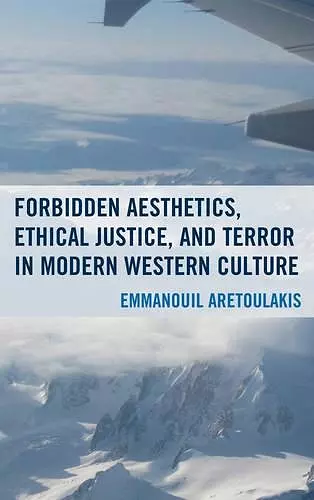Forbidden Aesthetics, Ethical Justice, and Terror in Modern Western Culture
Format:Hardback
Publisher:Lexington Books
Published:19th May '16
Currently unavailable, and unfortunately no date known when it will be back

Forbidden Aesthetics, Ethical Justice, and Terror in Modern Western Culture explores the potential links between terror and aesthetics in modern Western society, specifically the affinity between terrorism and the possibility of an aesthetic appreciation of terrorist phenomena or events. But can we actually have an aesthetic appreciation of terror or terrorism? And if we can, is it ethical or legitimate? Emmanouil Aretoulakis proposes that Western spectators and subjects from the eighteenth century onwards have always felt, unconsciously or not, a certain kind of fascination or even exhilaration before scenes of tragedy and natural or manmade disaster. Owing to their immorality, such “forbidden” feelings go unacknowledged. It would definitely be callous as well as politically incorrect to acknowledge the existence of aesthetics in witnessing or representing human misery. Still, as Aretoulakis insists, our aesthetic faculties or even our appreciation of the beautiful are already inherent in how we view, appraise, and pass judgment upon phenomena of terrorism and disaster. Paradoxically, such a “forbidden aesthetics” is ethical despite its utter immorality.
Emmanouil Aretoulakis embraces controversy and conflict with courage by delving into the forbidden aesthetics of the images of terrorism, unraveling the ethical and a-moral implications of the Kantian feeling of pleasure that trumps the impotency of the awe and terror of the sublime. He proposes that along with empathy and humor, aesthetic judgement empowers the viewer or reader who survives as witness to horrific events rather than cowering in fear to their devastation. If scholars of terrorism wish to reflect on its spectacular images in a meaningful way, this book's developing thesis will guide them through the multidisciplinary labyrinth of philosophy, semiotics, media studies, psychology, and sociology -- Julia Keefer, New York University
In this scholarly study, Aretoulakis makes a compelling case for recognizing the beauty in cataclysmic events that evoke terror, whether they be caused by humans or occur naturally. Guided primarily by a Kantian aesthetic of disinterestedness, he disavows ascriptions of the sublime and argues instead for recognizing a forbidden aesthetics of beauty in the experience of terror. He finds this fascination inexplicably present in the three terror-evoking events he analyzes: the suicide attack on the World Trade Center in New York City, the atomic bombing of Hiroshima and Nagasaki, and the great Lisbon earthquake of 1755. Widely informed and rich with unexpected insights, this book widens the scope and relevance of aesthetics. -- Arnold Berleant, author of Aesthetics beyond the Arts
- Winner of European Society for the Study of English Award, Category: Cultural and area studies in English.
ISBN: 9781498513128
Dimensions: 239mm x 162mm x 19mm
Weight: 445g
182 pages